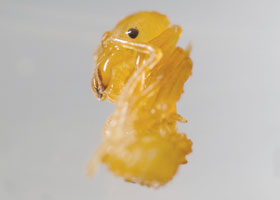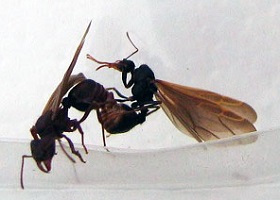What’s in a Leafcutter Ant Colony?
Have you ever watched ants moving in and out of a hole, and wondered what kinds of things could be found inside? We have too. To find out what these six legged animals were doing out of eyesight, we built a special home for a colony of ants. Not just any ants, we picked leafcutter ants. Leafcutter ants, as you might guess from their name, collect leaves. They use the leaves that they carry back to their nest to grow a fungus just like a farmer might grow tomatoes, or lettuce. What do they do with the fungus? They eat it. You might be thinking yuck about now, but for leafcutter ants fungus is their food of choice.
Below is a picture of the special ant home we built. If you click on parts of the image, you can learn more about what’s inside and what's going on in the colony.
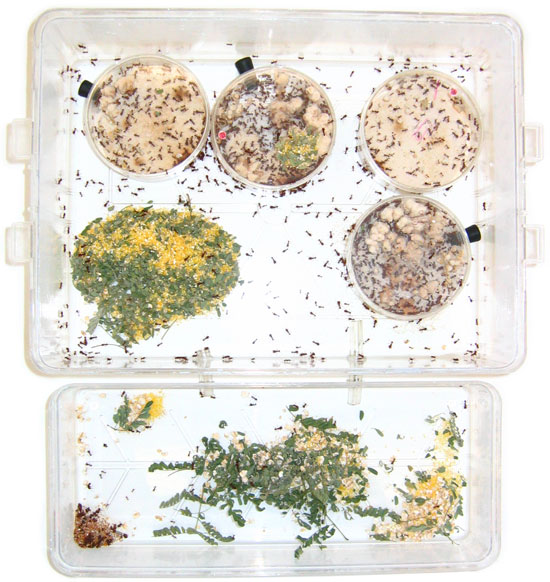
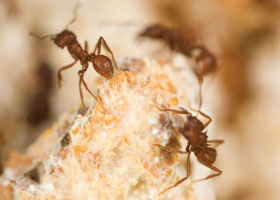 |
Fungus: Leafcutter ants don’t actually eat the leaves that they harvest. They use the leaves to grow mushrooms, and then they eat the mushrooms. So the ants are actually farmers, like humans! |
 |
Trash: Just like humans, ants produce trash as their colonies grow. The ants are very good at keeping their nest tidy by throwing out their trash into a trash pile. |
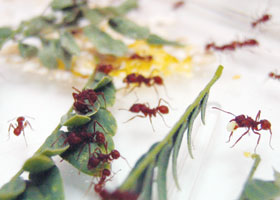 |
Foraging arenas: The major goal of ant foragers is to find food. In the lab, they can find it in these arenas that we set up. After the foragers find vegetation, they start chewing leaves off to carry back to the fungus gardens. |
Images by Rebecca Clark.
Read more about: Secrets of a Superorganism
Bibliographic details:
- Article: Leafcutter Ant Colony
- Author(s): Dr. Biology
- Publisher: Arizona State University School of Life Sciences Ask A Biologist
- Site name: ASU - Ask A Biologist
- Date published: 21 Dec, 2009
- Date accessed:
- Link: https://askabiologist.asu.edu/leafcutter-ant-colony
APA Style
Dr. Biology. (Mon, 12/21/2009 - 09:40). Leafcutter Ant Colony. ASU - Ask A Biologist. Retrieved from https://askabiologist.asu.edu/leafcutter-ant-colony
Chicago Manual of Style
Dr. Biology. "Leafcutter Ant Colony". ASU - Ask A Biologist. 21 Dec 2009. https://askabiologist.asu.edu/leafcutter-ant-colony
Dr. Biology. "Leafcutter Ant Colony". ASU - Ask A Biologist. 21 Dec 2009. ASU - Ask A Biologist, Web. https://askabiologist.asu.edu/leafcutter-ant-colony
MLA 2017 Style
Be Part of
Ask A Biologist
By volunteering, or simply sending us feedback on the site. Scientists, teachers, writers, illustrators, and translators are all important to the program. If you are interested in helping with the website we have a Volunteers page to get the process started.





